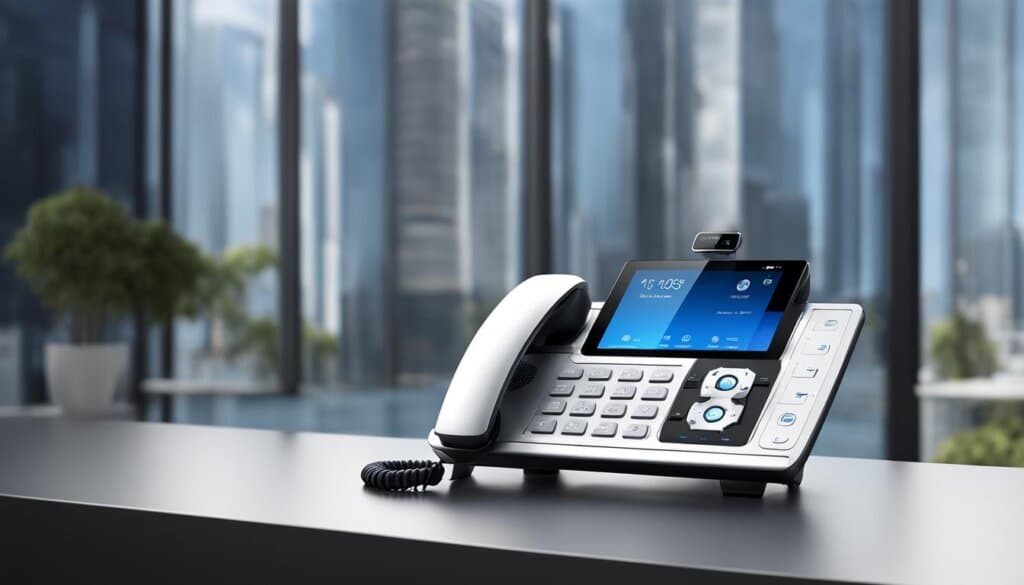Table of Contents
VoIP phone technology has revolutionized communication in the digital era. But what exactly is a VoIP phone and how does it work? In this article, we will explore the ins and outs of VoIP phones, their features, and their advantages and disadvantages.
VoIP, which stands for Voice over Internet Protocol, enables the transmission of phone calls over an IP network, such as the internet. Unlike traditional analog phones, VoIP phones convert analog telephony audio into a digital format, allowing it to be transmitted over the internet and vice versa.
There are two main types of VoIP phones: hardware-based and software-based. Hardware-based VoIP phones resemble traditional phones and come with physical features like touchpads and displays. On the other hand, software-based VoIP phones, also known as softphones, are installed on computers or mobile devices.
VoIP phones offer features and capabilities not found in traditional phones. They can integrate with other business applications, provide mobile and desktop access, and offer advanced features like call recording and analytics. However, it’s important to consider both the advantages and disadvantages of VoIP phones before adopting them as a primary means of communication.
In the following sections, we will delve deeper into how VoIP phones work, their different types and features, as well as the pros and cons of using VoIP technology. Stay tuned for a comprehensive guide to VoIP phone technology.
How Does a VoIP Phone Work?
VoIP phones utilize advanced technology to enable communication by converting voice calls into digital signals that can be transmitted over IP networks, such as the internet. This allows for efficient and cost-effective communication, as compared to traditional analog phones.
VoIP phones function through two main methods: hardware-based devices and software-based clients. Hardware-based VoIP phones resemble traditional telephones and come equipped with features like speakerphones, touchpads, and displays. On the other hand, software-based clients are typically installed on computers or mobile devices, providing the same capabilities as hardware-based phones.
Regardless of the method, VoIP phones rely on various networking components to establish connections. Assigning IP addresses through the Dynamic Host Configuration Protocol (DHCP) and utilizing the domain name system (DNS) enable devices to connect to each other seamlessly. Additionally, protocols such as H.323 facilitate the delivery of voice communications over the internet, ensuring reliable and high-quality calls.
“VoIP phones work by converting voice calls into digital signals that are sent over IP networks.”
Overall, VoIP phones streamline communication processes by harnessing digital signals and IP networks, providing enhanced capabilities and flexibility for businesses and individuals alike.
Key Points:
- VoIP phones convert voice calls into digital signals for transmission over IP networks.
- VoIP phones can be hardware-based devices or software-based clients.
- Networking components like IP addresses and DNS facilitate device connectivity.
- Protocols such as H.323 ensure reliable voice communication over the internet.
Types and Features of VoIP Phones
When it comes to VoIP phones, there are two main types to choose from: hardware-based and software-based. Both options have their own unique set of features and advantages, catering to different needs and preferences. Let’s explore what each type has to offer:
Hardware-Based VoIP Phones
Hardware-based VoIP phones resemble traditional telephones in terms of their physical design. They come equipped with features such as speakerphones, touchpads, and displays, making them easy to use and navigate. These phones support various functionalities, including call transfer, multiparty calling, and video transmission. They offer a familiar user experience for those accustomed to traditional phones while leveraging the advantages of digital communication.
Furthermore, hardware-based VoIP phones are known for their reliability and consistent call quality. They are designed to handle high call volumes and are suitable for businesses that require a dedicated and robust communication solution. Additionally, these phones can integrate with other hardware devices and business applications, expanding their functionality and enhancing productivity.
Software-Based VoIP Phones
In contrast, software-based VoIP phones, also known as softphones, do not require physical hardware. Instead, they are installed on computers or mobile devices, leveraging the power of software to enable VoIP communication. These phones offer similar capabilities to their hardware-based counterparts, including call recording, call analytics, and integration with customer relationship management (CRM) software. They provide the flexibility of using existing devices for communication, eliminating the need for additional hardware investments.
Software-based VoIP phones are especially popular for remote work and flexible environments as they provide mobile and desktop access to communication tools. They offer the convenience of making and receiving calls from anywhere with an internet connection, enabling seamless communication across multiple devices.
Both hardware-based and software-based VoIP phones have their strengths and cater to different use cases. The decision ultimately depends on the specific needs and preferences of the user or business. Below is a summary highlighting the key features and benefits of each type:
| Hardware-Based VoIP Phones | Software-Based VoIP Phones |
|---|---|
| Resemble traditional telephones | Installed on computers or mobile devices |
| Physical features such as speakerphones, touchpads, and displays | Utilize existing devices for communication |
| Support call transfer, multiparty calling, and video transmission | Offer call recording, call analytics, and CRM integration |
| Integrate with other hardware devices and business applications | Provide mobile and desktop access |
Whether you prefer the familiarity and reliability of hardware-based VoIP phones or the flexibility and convenience of software-based VoIP phones, both options offer advanced features and capabilities that go beyond traditional analog phones. Choose the type that aligns with your communication requirements and enhances your overall productivity.

Advantages and Disadvantages of VoIP Phones
VoIP phones offer several advantages over traditional phone systems. One of the key benefits is cost savings. VoIP calls are transmitted over the internet, eliminating the need for costly long-distance charges. This makes international calls much more affordable, especially for businesses with global operations. Additionally, VoIP phones often come with bundled services like video calling, instant messaging, and voicemail transcription, providing businesses with a comprehensive communication solution.
Another advantage of VoIP phones is their mobility and scalability. Employees can use their VoIP phones anywhere they have an internet connection, whether that’s in the office, at home, or on the go. This allows for greater flexibility and remote work opportunities. VoIP systems are also highly scalable, meaning businesses can easily add or remove users as their needs change. This makes them a flexible solution for growing businesses.
However, it’s important to consider the disadvantages of VoIP phones as well. One potential issue is performance constraints due to reliance on internet connectivity. If the internet connection is slow or unstable, it can lead to dropped calls, poor audio quality, or delays. Businesses should ensure they have a reliable internet connection with sufficient bandwidth to support their VoIP phone system.
Another disadvantage is related to emergency calling. Traditional landline phones are directly connected to emergency services and can quickly provide location information when a call is made. With VoIP phones, the connection is digital and dependent on the internet. In some cases, emergency services may not be able to accurately determine the caller’s location, which could delay response times. Businesses should have a backup plan for emergency communication, especially if they rely heavily on VoIP phones.
FAQ
What is a VoIP phone?
A VoIP phone, also known as an IP phone, is a telephone that uses voice over Internet Protocol (VoIP) technology to transmit phone calls over an IP network.
How does a VoIP phone work?
VoIP phones convert voice calls into digital signals that are sent over IP networks, such as the internet. This can be done through physical phones or software-based clients installed on computers or mobile devices.
What are the types and features of VoIP phones?
There are two main types of VoIP phones: hardware-based and software-based. Hardware-based phones resemble traditional telephones and come with physical features such as speakerphones and displays. Software-based phones, also known as softphones, are installed on computers or mobile devices. Both types offer features such as call transfer, multiparty calling, and video transmission.
What are the advantages and disadvantages of VoIP phones?
VoIP phones offer advantages such as cost savings, greater mobility and scalability, integration with other business applications, and access to additional features like video calling and voicemail transcription. However, they also have some disadvantages, such as performance constraints due to internet connectivity reliance and potential issues with emergency calling.







